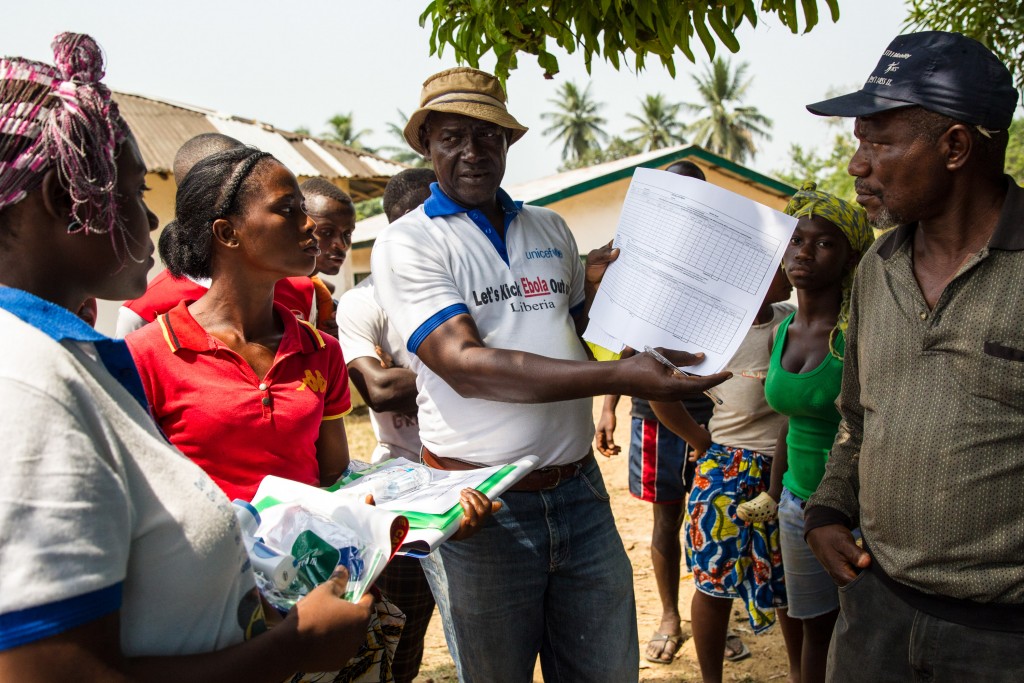One day after news outlets marked the one-year anniversary of the World Health Organization’s announcing the Ebola outbreak in Africa, Liberia has confirmed its first new case of Ebola in more than two weeks, with concerns over how many may have been exposed. The New York Times reports:
Worries have widened in recent days over the number of people in Liberia who may have been exposed to the country’s first Ebola case in more than two weeks, a street vendor who lived in a one-bathroom house shared with 52 others in a Monrovia suburb and who had sold food at a school where more than 1,900 students are enrolled.
The patient, identified as Ruth Tugbah, 44, had been in contact with a range of people, including her children and a pastor who had sought to comfort her, after she developed a fever and was contagious, aid workers said Tuesday.
Tugbah’s daughter Beneta Kun has developed symptoms but has not been diagnosed.
National Public Radio ran a report on March 23 which takes a close look at Liberia, one year after the outbreak began, with a health care system trying to get back where it started – but where it started was already devastatingly under-resourced:
Michelle Niescierenko is a pediatric emergency physician at Boston Children’s Hospital. But for the past five months she has been in Liberia, helping the country’s 21 public hospitals get back on their feet after the devastating Ebola outbreak there. She says the challenges they face are shocking.
The hospitals run on generators, which run on fuel, and often there is only one gas station per county in Liberia.
Hospitals have to send a truck along rutted dirt roads to pick up the fuel. Those roads can be impassable during the rainy season, and if the truck can’t make it, then the hospital just has to make do with less power. This happens so often that a lot of the hospitals Niescierenko worked with end up operating without electricity for as long as 12 hours a day.
This has nothing to with Ebola. This is what it has been like in Liberia for years. Like the two other countries at the center of the outbreak, Guinea and Sierra Leone, Liberia is one of the world’s poorest countries. And now that cases are down in Liberia — there’s been only one new case in weeks — attention is shifting to building up the broader health system.
The problem is finding donors to help:
Recruiting and training new health workers is key, because experts warn that unless the health systems in West Africa are brought up to scratch, an epidemic on the scale of this one will happen again.
Unfortunately, building national health systems doesn’t tend to attract a lot of love from international donors, says Erin Hohlfelder, who has been pushing for this kind of funding on behalf of the ONE Campaign, a global health advocacy group.
“It’s certainly not as ‘sexy’ — quote unquote — as things like treatment for HIV or bed nets for malaria, which are very tangible and easy to understand.”
NPR also includes excerpts from reporters’ notebooks over the past year of the Ebola outbreak here.
The Washington Post also marked the anniversary with a piece, “After Ebola,” exploring the lives of the survivors and their struggle to find work:
More than 4,200 Liberians are dead. The economy is barely sputtering back to life following months in which panicked investors fled and residents deserted fields and factories, fearing the insidious disease.
The Post‘s lens on the larger story is through the individual story of Josephine Dolley, who lost her entire family.
Nine months ago, Dolley was making $720 a month as a music instructor and secretary, well above the median income. It was enough to pay her tuition and to buy an acre of land near the beach to build a house.
She had a path laid out for herself, and she had given that path a name: the Score of Life.
Before Ebola struck, Dolley was scoring well. She had two children and a kind, broad-shouldered husband named Joshua. She was an icon in New Kru Town, a member of the country’s striving postwar generation, so successful and self-possessed that the whole neighborhood started calling her “Mommy” when she was in her 20s.
Then the illness erupted. It swept through the home where Dolley lived with her extended family. They died one after the other. Her husband. Her two young sons. The 22-year-old neighbor she had taken in, Emmanuel. Every single person died — 29 relatives in all. Everyone except her.
The full story can be read here.
Posted by Cara Ellen Modisett

